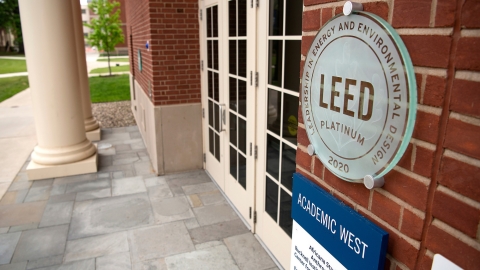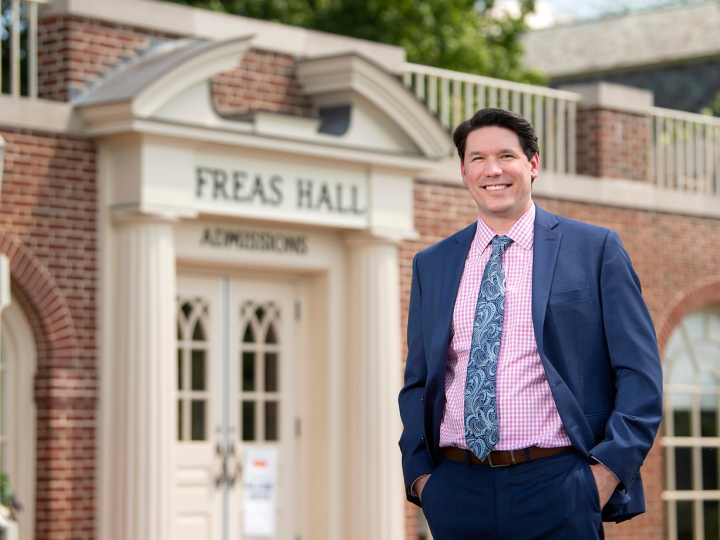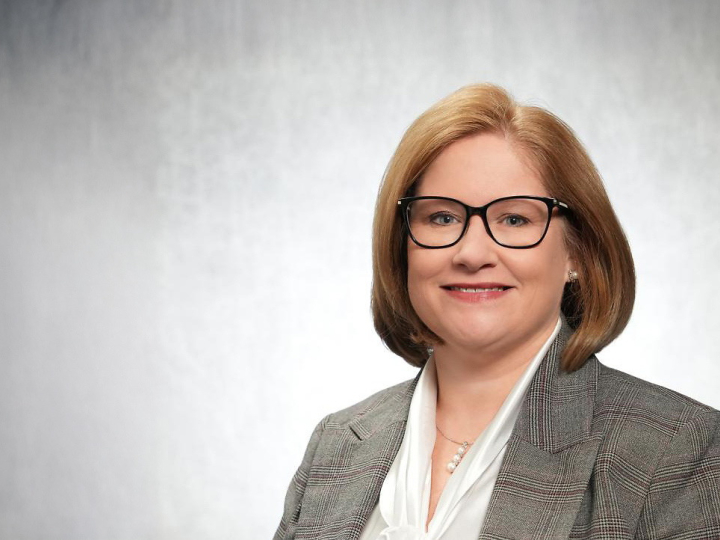
Proven Sustainable: Academic West Earns Highest Possible Certification for Sustainable Operations
May 29, 2020
Academic West received LEED Platinum Certification for Operations and Maintenance in May, affirming Bucknell's ongoing commitment to operating the building sustainably. Photo by Emily Paine, Communications
Shortly after Academic West opened in 2013, the classroom and office building on the Bucknell University campus received LEED Silver Certification for Building Design and Construction from the U.S. Green Building Council, affirming it was designed to meet some of the most stringent global standards for sustainability.
But it's one thing to plan for sustainability and another to actually be sustainable. In May, Bucknell proved its approach to sustainable design is more than just lip service by earning LEED Platinum Certification for Operations and Maintenance for Academic West. The facility is the first academic building in Pennsylvania and one of the first in the Northeast to receive this highest-possible rating, which was verified by Green Business Certification Inc. LEED, which stands for Leadership in Energy & Environmental Design, is the most commonly used green building rating system in the world.
Steve Durfee, campus energy manager, says the recognition not only establishes Bucknell as a leader in planning for sustainability, but also in continuing to seek out innovative solutions to make Bucknell's campus even greener. The recertification effort will serve as a pilot for proving and improving the efficiency of other facilities on campus — including 11 that are LEED-certified as well a 12th, Academic East — that are seeking LEED Gold certification and another, the Management/Art & Art History Building, that is under construction and also designed to meet LEED Gold standards, Durfee says.
"To earn this certification you have to prove that the building actually has a small environmental footprint, prove that it actually provides a good indoor environmental quality to the occupants — all based on data," Durfee says. "Now that we've done that, we're going to take what we learned and apply it to the next LEED-certified building on campus, and the next."

Academic West (left) and Academic East (right), which houses many College of Engineering facilities. Photo by Emily Paine, Marketing & Communications
The data that enabled the certification comes from a smart metering system designed into Academic West. Every five minutes, sensors upload to the internet information about the building's energy use and the indoor environment — like temperature, water flow and HVAC settings — giving Bucknell Facilities staff a real-time look at Academic West's energy performance and allowing the University to make decisions that further improve efficiency. Planning ahead by installing those systems when the building was constructed played a significant role in helping Bucknell secure this new designation, Durfee says, as they capture data to quantify the environmental benefits achieved via the building's many other green features, which include:
- Rain gardens that allow water runoff from the building to seep into the ground slowly, reducing flood risks
- Room occupancy sensors that turn off lights and adjust HVAC settings when no one is present
- Large windows and glass interior walls that allow natural light to permeate the building
- A research green roof that helps the building stay cool and serves as a laboratory for student and faculty research
Together with these measures that reduce the building's carbon footprint (decarbonization), as well as efforts to improve sustainability every time new buildings are constructed or old ones are renovated (decentralization), the digital technologies built into Academic West put Bucknell at the forefront of the three largest trends in sustainable design, says Victor Udo, Bucknell's director of campus sustainability.
"With Academic West, we've laid down a foundation that we are now building on, as we lead the charge toward decarbonization, decentralization and digitalization," Udo says.
An Ongoing Effort
The certification also reflects Bucknell's continuing efforts to make Academic West — and campus as a whole — more sustainable through greener operating processes and procedures, including:
- A recently launched green cleaning initiative that replaces harsher chemicals and power-intensive cleaning equipment with more environmentally friendly alternatives
- A waste audit examining ways to improve recycling and composting on campus
- Surveys of occupants to ensure the building's indoor environment meets their needs for work and study
- Education programs to help students, faculty and staff make their work more sustainable
For Jeff Loss, interim associate vice president for facilities, those final efforts may be the most important, because a more sustainable campus and planet all begins with education.
"These ratings help drive a culture of sustainability on campus, and it all starts with the occupants who work and learn in our sustainable buildings," Loss says. "They understand that what they are doing on a day-to-day basis has a real capacity to help Bucknell use less energy, use less water and advance toward a more green future."

